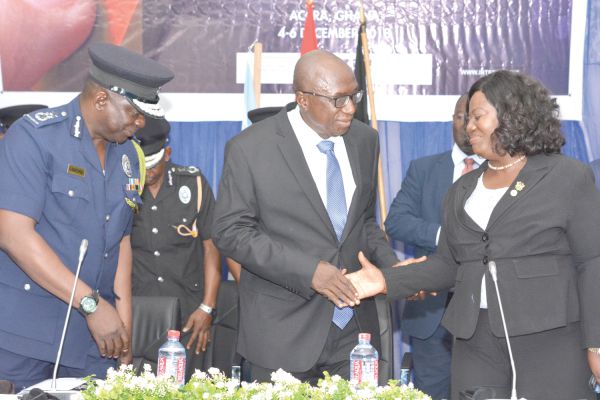
Victims lose $95m to cybercrime
Victims of various forms of cyber fraud lost a total of $95 million between January and August 2018 and the amount is projected to hit $120 million by the end of the year.
“This trend obviously is very worrying and there is the need to build the capacity of the Cybercrime Unit of our police service and, in particular, all the law enforcement agencies in Ghana to fight the growing menace,” said Mr Ambrose Dery, the Minister of the Interior.
Mr Dery made this known when he opened the fifth African Working Group Cybercrime meeting for heads of cyber crime units of the police service of 15 African countries in Accra.
The meeting was organised by the INTERPOL General Secretariat, the Council of Europe, in collaboration with the Ghana Police Service.
Statistics from the Criminal Investigations Department (CID) of the Ghana Police Service shows that about 82 per cent of the cases reported to the cybercrime unit were related to fraud.
The victims, in most of the cases, were defrauded through romance, investment, advanced fee payment, email compromise, identity theft, mobile money, social media impersonation and Automated Teller Machine (ATM) fraud, among others.
In 2016, the amount lost to fraud and that stolen via cyberspace was $35 million. The figure increased to $69.5 million in 2017, an almost 100 per cent increment.
Global threat
Globally, Mr Dery said cybercrime cost was on the rise, with experts estimating it to hit $21 trillion by 2021.
These estimates, he said, would include damage and destruction of data, stolen money, lost productivity, theft of intellectual property, theft of personal and financial data, embezzlement, fraud, post-attack disruption to the normal course of business, forensic investigation, restoration and deletion of hacked data and systems and reputational harm.
The global cost of cybercrime, he said, rose to unprecedented levels in 2017 where it cost the world about $608 billion.
With Africa seeing 20 per cent growth in the use of the internet, Mr Dery said the emergence of new technology was increasingly turning the continent into a source, as well as a target of cybercrime.
“Here in Africa, the cybercrime attacks for individuals, businesses and government has increased over the years. Cybercrime cost Africa an estimated $3.5 billion in 2017,” he said.
Wakeup call
When he took his turn to address the participants, the Inspector General of Police (IGP), Mr David Asante Apeatu, stated that cybercrime had been the bane of the 21st Century economy.
“It causes a lot of financial loss to various sectors.
Whole governments have been put on edge because there are threats of their systems being hacked into.
Cybercrimes have been made easy because all a criminal needs is a device and internet connectivity in a location to perpetrate the crime across different jurisdictions,” he said.
“Our integrated efforts will be in line with the African Union Agenda 2063 envisioned to have “an integrated, prosperous and peaceful Africa, driven by its citizens and representing a dynamic force in international arena,” he added.
Cybercrime, he said, was a wake up call for law enforcement agencies across the world to start thinking about ways of solving crime and removing the barriers posed by differences in legislation, policies and physical frontiers.
Challenges
The Minister of Communications, Mrs Ursula Owusu-Ekuful, said the Government of Ghana was committed to fighting cyber-crime.
Ghana, she said, had acceded to a number of international conventions and was assisting other African countries in their efforts to address cybercrime and cyber security challenges.
She outlined some of the challenges in the fight against cybercrime to include the lack of sufficient legal grounds for international cooperation and the lack of capacity, especially forensic capabilities, to successfully investigate and obtain digital evidence for criminal prosecutions, non report of cybercrimes, inadequate legal provisions and new technological development.
The acting Director of the Interpol Cybercrime Directorate, Mr Takayuki Oku, said the cyber criminals were usually a step ahead of the law enforcers and had a sophisticated network across the world.
However, with 194 member countries, he expressed optimism that cybercrime units could network by sharing information and data, which could help track and break the network of the cyber criminals to make the cyberspace safe.
